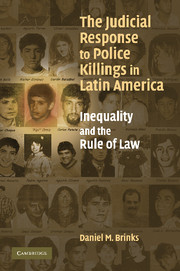Book contents
- Frontmatter
- Contents
- Preface
- 1 Effectiveness and Inequality in the Legal System
- 2 Charting Injustice in Argentina, Brazil, and Uruguay
- 3 Informational and Normative Shifts Across Jurisdictions
- 4 Buenos Aires – Political Interference and Informational Dependence
- 5 São Paulo – Normative Autonomy and Informational Failures
- 6 Uruguay – Strong Results from a Weak System
- 7 Córdoba – High Levels of Inequality in a Strong System
- 8 Salvador da Bahia – Social Cleansing Under Political and Judicial Indifference
- 9 Binding Leviathan
- Appendix: Methods, Case Selection, and Sampling
- References
- Index
9 - Binding Leviathan
Published online by Cambridge University Press: 07 September 2009
- Frontmatter
- Contents
- Preface
- 1 Effectiveness and Inequality in the Legal System
- 2 Charting Injustice in Argentina, Brazil, and Uruguay
- 3 Informational and Normative Shifts Across Jurisdictions
- 4 Buenos Aires – Political Interference and Informational Dependence
- 5 São Paulo – Normative Autonomy and Informational Failures
- 6 Uruguay – Strong Results from a Weak System
- 7 Córdoba – High Levels of Inequality in a Strong System
- 8 Salvador da Bahia – Social Cleansing Under Political and Judicial Indifference
- 9 Binding Leviathan
- Appendix: Methods, Case Selection, and Sampling
- References
- Index
Summary
Sir Thomas More: … What would you do? Cut a great road through the law to get after the Devil? William Roper: I'd cut down every law in England to do that! More: Oh! And when the last law was down, and the Devil turned on you – where would you hide, Roper, the laws all being flat! This country's planted thick with laws from coast to coast – man's laws, not God's – and if you cut them down … do you really think you could stand upright in the winds that would blow then?
Robert Bolt, A Man for All Seasons (1962)In Latin America, states have often responded to the felt need to “cut a great road through the law to get after the Devil” of the hour. The last devil was communism; the new devil (one of them, anyway) is crime, and vulnerable citizens are once again left struggling to stand upright in the winds that blow when immediate results trump legal processes. From iron-handed law-and-order efforts like “super mano dura” criminal reform proposals in Central America, to illegal ones like extra-judicial executions, lynchings, and extermination groups, due process protections take a back seat to citizen security. When this happens, as the experience of victims of police violence makes clear, it is very difficult for courts alone to stand up to those winds, even if legal protections have not been formally abolished.
- Type
- Chapter
- Information
- The Judicial Response to Police Killings in Latin AmericaInequality and the Rule of Law, pp. 242 - 260Publisher: Cambridge University PressPrint publication year: 2007



